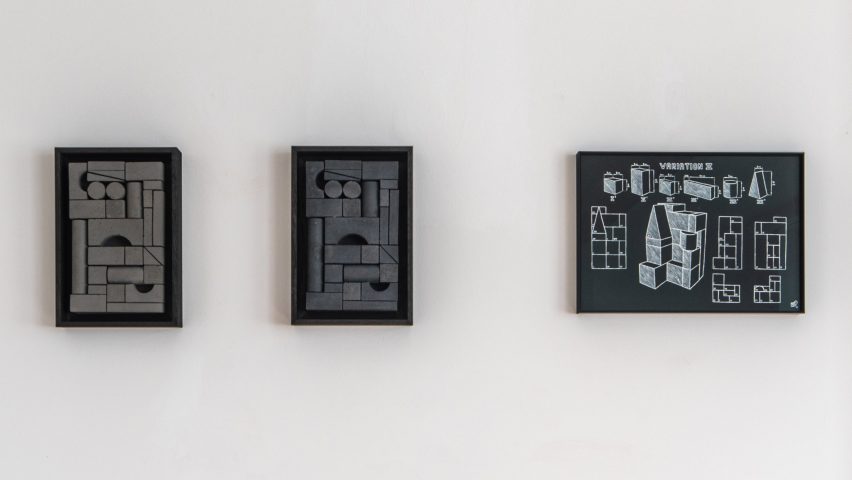Conrad Willems' architectural sculptures based on toy blocks feature in a solo exhibition inside a Victor Bourgeois modernist villa in Brussels.
Modular Sculptures features a number of works by Ghent-based Willems, including the almost three-metre tall Construction IV, the latest in his series of freestanding architectural sculptures made from self-supporting stone blocks.
The shapes of the blocks are based on the children's wooden construction blocks developed in the 19th century by educational theorist and teacher Frederich Fröbel. Willems was given a set by his godmother as a child and now has more than 2000 pieces in his collection.
"The influence of playing with these blocks has always been present in my work," Willems told Dezeen. "But more and more, I believe 'play' is a really important concept."
"To make a structure, I will first work with actual wooden toy blocks, looking for a structure I like," explained Willems. "When I am confident of the final form, I make a construction drawing which will later double as an installation plan."
Construction IV occupies the central space in what was once the atelier of the celebrated 20th century Belgian sculptor Oscar Jespers. It is made from 500 pale Borrèze sandstone blocks in 10 shapes and was built in-situ by Willems. The construction drawing hangs on one wall.
Toy building blocks are a recurring source of inspiration for architects and artists. Earlier this year designer Andrea Stinga created an animation reimagining the works of architecture's Pritzker Prize-winners as children's building blocks. Architect Kengo Kuma has even designed his own version, described as the Japanese alliterative to Lego.
"Since the construction drawing specifies which type of block goes where, but not the exact piece, the works are slightly different each time I build them," said Willems. "Every piece has unique stone markings which have an impact on the final look of the work."
A second room on the ground floor contains the work Allayment, which consists of 1,296 pieces of brick, which were broken in an earlier performance, stacked into three metal frames with the broken edges facing outwards.
On the mezzanine – originally an exhibition space for Jesper's smaller works and accessed via a curved-wall staircase – is Column, a sculpture made from 667 pieces of Belgian fossil stone block arranged to create a cylindrical shape.
"A common thread through all my work is geometry, repetition and modularity: simple shapes and ideas, repeated and layered into something less simple," said Willems.
The final exhibition room on the first floor contains a series of smaller stone sculptures as well as a set of concrete casts of Willem's collection of wooden toy blocks, photography of one of the Construction pieces by Cedric Verhelst and the video of the assembly of Construction IV.
Atelier Jespers is an exhibition space inside a white, modernist villa designed by the architect Victor Brougeois as a home for Jespers in 1929. Jesper's work and gallery spaces now form Atelier Jespers, run by the house's current owner Jean-François Declercq. The more domestic areas of the house remain private.
"Victor Bourgeois created a true modernist masterpiece," said Willems. "You can really feel that this house was made to work with and showcase sculptures."
Jespers, who died in 1970, was widely celebrated during his lifetime but his work has had little attention since. He specialised in creating cubism-inspired works using Belgian blue stone, as well as white stone and marble – a similar material palette to the one used by Willems in his Construction series.
"Each of these materials also carries a history of cultural and architectural references, adding an extra layer of meaning to the structures," said Willems.
Previous exhibitions in Atelier Jespers have included a selection of works created by the designer Pierre Jeanneret for the Indian city of Chandigarh and a collection of 13 mobile chandeliers by the London-based designer Michael Anastassiades.
Modular Sculptures will run at Atelier Jespers until 22nd July 2018 on Avenue du Prince Héritier in Brussels, Belgium.
Visits are by appointment only and can be arrange with the artist, who is contactable via Instagram or email.

